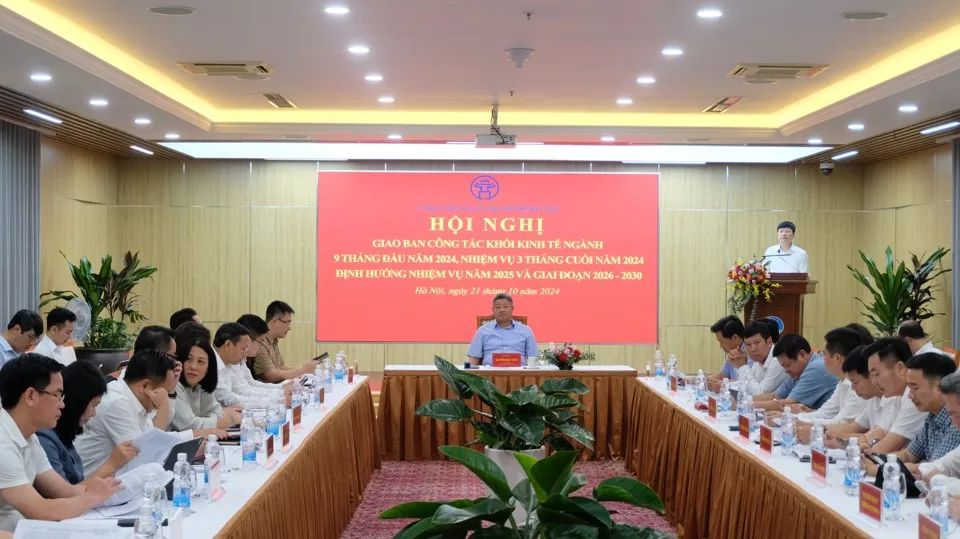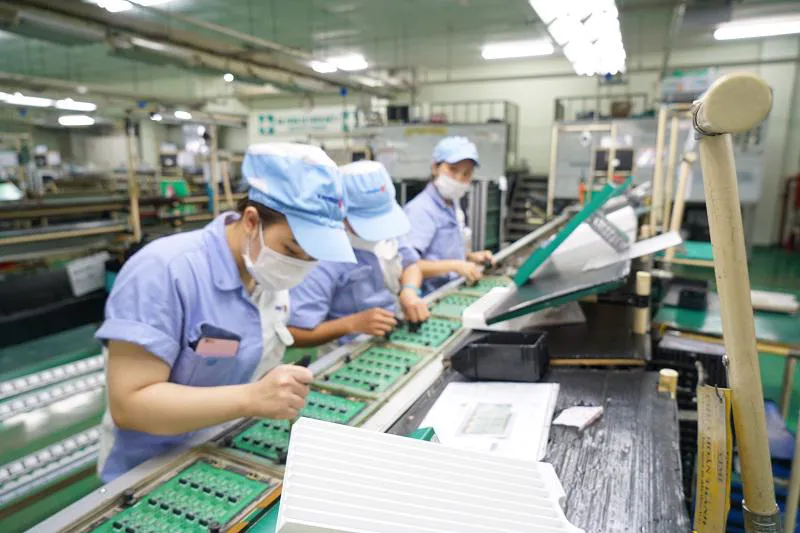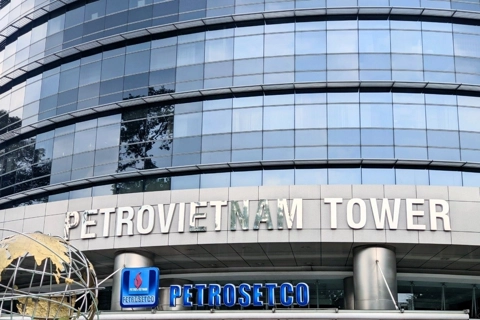Hanoi targets double-digit growth over next decade
The economic goal will require the cooperation and accountability of all city departments.
Hanoi aims for economic growth of over 10% for at least a decade, a goal that will be crucial for enhancing the city's status and improving residents' quality of life, according to Nguyen Manh Quyen, Vice Chairman of the Hanoi People's Committee.
| An overview of the conference, chaired by Nguyen Manh Quyen, Vice Chairman of the Hanoi People's Committee. Photo: Lao dong thu do Newspaper |
At a conference on October 21 setting out strategic goals for 2025 and the period 2026-2030, Quyen emphasized the city's current potential, saying that achieving this goal requires all departments to work together and act responsibly.
Economic growth vital to Hanoi's development
Underscoring the urgent need for economic growth, Quyen pointed out that the incomes of Hanoi's citizens continue to lag behind those of many cities in Southeast Asia. This gap hinders economic growth once the city cannot catch up with the global average.
He outlined the need to set priority goals to attract investment at different stages. Hanoi will focus on strong industrial development by 2030, prioritizing sustainability and aesthetics, with a vision for 2045.
Quyen highlighted the movement in agriculture toward high-value, diversified agriculture. Hanoi's agricultural approach must be different from other regions, with rice-growing areas and developing a distinctive and high-yield rice brand.
Regarding rural development, he urged the city to complete the urbanization of four rural districts in 2024 and achieve its rural development goals one year ahead of the targets set by the 17th Party Congress in Hanoi.
Quyen also noted that the city continues to support domestic investors to boost trade and services. He urged the city's Department of Industry and Trade to actively work with other sectors and localities to expedite two international wholesale market projects in Gia Lam District and a regional shopping mall along the Nhat Tan - Noi Bai road, which are key to boosting tourism and trade.
In the tourism sector, the vice chairman acknowledged recent recovery efforts and urged the Hanoi Department of Tourism to continue to develop itineraries that link local attractions to focus on high revenues instead of the number of visitors.
Regarding transportation, he stressed the need for green transitions. By 2030, the city will replace its entire bus fleet with green vehicles and establish bus companies that meet high standards, similar to hotel star ratings.
Hanoi's GRDP estimated to grow by 6.12%
| Electronics production at Katolec Vietnam in Quang Minh Industrial Park, Hanoi. Photo: Pham Hung/The Hanoi Times |
At the conference, Dinh Quoc Hung, Deputy Head of the Hanoi People's Committee Office, reported that the city's economy showed signs of growth and recovery in the first nine months of 2024. The Gross Regional Domestic Product (GRDP) is estimated to increase by 6.12%, compared to last year's figure of 6% for the same period.
In particular, the city's State budget revenue reached VND376.4 trillion ($14.8 billion), up 22.2% year-on-year. Foreign investment hit $1.54 billion. Meanwhile, tourism saw a strong recovery, with an estimated 21.12 million visitors to Hanoi, up 11.7% on year.
Concerning the recovery efforts, Hung said the city has focused on restoring agricultural production after the storm, promoting rural economic development, and encouraging new rural construction.
In terms of industrial development, Hanoi has started the construction of 28 out of 43 planned industrial clusters. Three industrial park projects were approved by the prime minister, including the clean industrial park in Soc Son District and two industrial parks in Dong Anh and Phung Hiep. The prime minister also signed a decision to establish the Hanoi Biotechnology Hi-tech Park.
At the conference, Nguyen Kieu Oanh, Deputy Director of the Hanoi Department of Industry and Trade, said the sector will continue to shift towards a green and circular economy, focusing on low carbon emissions and the development of high-tech industries. In this regard, outsourcing and assembly will decline.
"Hanoi prioritizes attracting investment in high-value and sizeable projects. We aim to develop key industrial products using advanced and environment-friendly technology while strengthening supporting industries for the city's priority sectors and the wider Red River Delta region," she emphasized.
On trade, the leaders of the two departments of Industry and Trade and Agriculture have pledged to ensure an adequate supply of goods, strengthen linkages, and stimulate consumer demand. They will also focus on developing high-value trade services and e-commerce.
Le Quang Long, Head of the Hanoi Industrial Park and Export Processing Zones Management Authority reported that they are accelerating infrastructure projects in key industrial areas, including Dong Anh, Phung Hiep, Bac Thuong Tin, and the Biotech High-Tech Park, with the goal of attracting $650 million in industrial park investments by the end of 2024, a 10% increase from 2023.
Meanwhile, Nguyen Xuan Dai, Director of the Hanoi Department of Agriculture and Rural Development, said the city will continue to plant higher-value crops in low-yield rice production areas. Emphasis will be placed on livestock production, focusing on breeding, restructuring herds, and promoting high-quality livestock while preserving indigenous breeds.
He added that the city plans to develop animal husbandry in key regions and communes that are in line with local development strategies.













